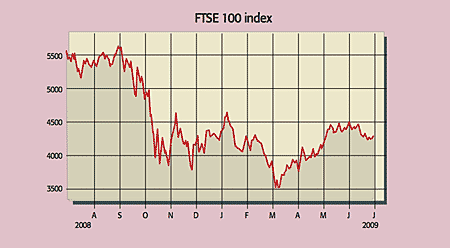Get the latest financial news, insights and expert analysis from our award-winning MoneyWeek team, to help you understand what really matters when it comes to your finances.
You are now subscribed
Your newsletter sign-up was successful
Want to add more newsletters?

Twice daily
MoneyWeek
Get the latest financial news, insights and expert analysis from our award-winning MoneyWeek team, to help you understand what really matters when it comes to your finances.

Four times a week
Look After My Bills
Sign up to our free money-saving newsletter, filled with the latest news and expert advice to help you find the best tips and deals for managing your bills. Start saving today!
After a roller-coaster ride during the first six months of 2009, what next for the FTSE 100?
It has been stuck in a 1,000-point range since October, falling back every time it has reached 4,500, notes Neil Hume in the Financial Times, and it may well remain range-bound for now.
The latest pause is due to the fact that stocks were "getting excited" about an economic recovery even though "there was no evidence of genuine growth", says James Foster of Artemis. Until there is clear evidence of such a recovery, stocks "will tread water", says Mike Lenhoff of Brewin Dolphin.
MoneyWeek
Subscribe to MoneyWeek today and get your first six magazine issues absolutely FREE

Sign up to Money Morning
Don't miss the latest investment and personal finances news, market analysis, plus money-saving tips with our free twice-daily newsletter
Don't miss the latest investment and personal finances news, market analysis, plus money-saving tips with our free twice-daily newsletter
But while markets seem to have acknowledged that they've factored in a recovery too soon, what they haven't yet realised is that we are not heading for a "normal" post-war "recovery cycle", as John Mauldin of Investorsinsight.com puts it. Analysts are still pencilling in a 23% rebound in S&P 500 operating profits next year. But "this time it's different", warns Mauldin. "We are hitting a massive reset button on the economy."

Debt-soaked Anglo-Saxon consumers are finally rebuilding their savings and working off their debt, so with the share of consumption of US GDP now set to dwindle from 70%, we are going to "have to shutter quite a few factories and businesses" and not just in America but in Europe and Asia too. Another key change is far greater involvement of governments in the economy, while the huge cost of their rescue packages implies higher future taxes.
The financial system, meanwhile, will be "delevered and re-regulated", says Mohamed El-Erian of Pimco, with government attempts to reduce risky lending lowering credit growth. The credit bubble implosion is a shock "that goes way, way beyond a cyclical flesh wound" for the world economy. Even leaving aside the leverage of the past few years, expect "muted growth" for up to five years.
Given this unpromising backdrop, you can see why Saxo Bank expects "risk appetite to plummet again" after the summer as the recovery disappoints, while Jeremy Grantham of GMO thinks developed world stocks could stagnate for years. "Things will never be quite the same again," says Tim Price of PFP Wealth Management. It's time for investors to shrink their aspirations.
Huge cash piles won't boost stockmarkets
Bulls insist that the historically high cash pile sitting in money market funds in the US is bullish for stocks, says Capital Economics.
But whether more of it finds its way into shares "is unlikely to depend much on the size of the remaining" pile but rather on the outlook for risky assets.
Look at Japan. Over the past 14 years the return on cash has been miniscule, as it is in the US now, but the bulk of Japanese investors' wealth is still in cash and over the past 30 years retail investors' share of the stockmarket has fallen from 33% to 20% as confidence in equities has declined.
Get the latest financial news, insights and expert analysis from our award-winning MoneyWeek team, to help you understand what really matters when it comes to your finances.
MoneyWeek is written by a team of experienced and award-winning journalists, plus expert columnists. As well as daily digital news and features, MoneyWeek also publishes a weekly magazine, covering investing and personal finance. From share tips, pensions, gold to practical investment tips - we provide a round-up to help you make money and keep it.
-
 How to navigate the inheritance tax paperwork maze in nine clear steps
How to navigate the inheritance tax paperwork maze in nine clear stepsFamilies who cope best with inheritance tax (IHT) paperwork are those who plan ahead, say experts. We look at all documents you need to gather, regardless of whether you have an IHT bill to pay.
-
 Should you get financial advice when organising care for an elderly relative?
Should you get financial advice when organising care for an elderly relative?A tiny proportion of over 45s get help planning elderly relatives’ care – but is financial advice worth the cost?

